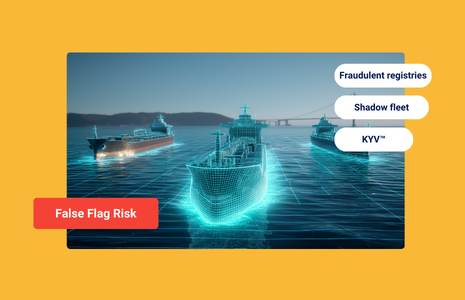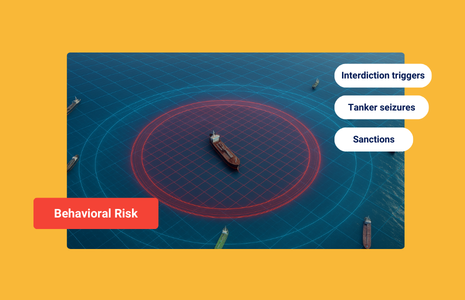Sanctioned Tanker Spoofs Location in Indonesian Waters Transmitting Fraudulent Flag

What’s inside?
A US-sanctioned tanker transmitting its flag as the fraudulent Curaçao registry is now spoofing its location in Indonesia’s territorial waters.
The tanker sailed into the area on July 16, indicating the navigational status as “at anchor” and then began location (GNSS) manipulation to obfuscate its true location. It then went dark on July 22, and stopped transmitting Automatic Identification Signals.
Deceptive Shipping Tactics Undermine Global Maritime Trade
These deceptive and illicit shipping behavior from Bluebell (IMO 9251810) in one of the world’s busiest maritime chokepoints underscore escalating safety and maritime security risks to Singapore, Malaysia and Indonesia from sanctioned and high-risk tankers loitering in waters near the Riau archipelago.
Bluebell, formerly known as Cross Ocean, had spent a month in this area, where about 80 Iran and Russia-trading tankers assemble for floating storage and unregulated ship-to-ship transfers of Western-sanctioned oil, often under dangerous conditions.
Heightened Security Risks Seen For Southeast Asia Maritime Hub
The ships form part of an inefficient logistics network of dark fleet tankers that ship crude cargoes from Russia, Iran and Venezuela via multiple ship-to-ship transfers in international waters to obscure the destination and origin.
Many elderly dark fleet tankers, much of them sanctioned, coalesce in this epicenter of maritime lawlessness within Malaysia’s EEZ. Dozens are falsely flagged like Bluebell, thus invalidating insurance and certificates of safety and seaworthiness, if they have any.
Bluebell is one of some 1900 ships identified by Windward as part of the dark fleet. These are high-risk vessels, often sanctioned, engaged in deceptive shipping behaviors with dark activity and links to trading with countries under Western sanctions..
Bluebell is among hundreds of vessels now transmitting a false flag, with 40% of Iran-trading tankers and 30% of Russia trading tankers in the dark fleet now using fraudulent registries, signaling false flags or whose flag status is unknown.
Fraudulent registries linked to these trades by the International Maritime Organization include Aruba, Benin, Curaçao, Guinea, Guyana, Eswatini, Malawi, Timor-Leste, and St Maarten. Other ships falsely transmit they are flagged with legitimate registries.
False Flag Registries Surge as Enforcement Tightens
The unprecedented scale and prevalence of falsely flagged ships – numbers have doubled in less than 12 months – is now a significant threat to the regulatory integrity of global seaborne trade and undermines the foundations of the world’s maritime economic system.
The use of fraudulent flags has surged as Western regulators step up enforcement and open registries increasingly deregister vessels tied to sanctioned trades — pushing bad actors to seek alternative, deceptive methods to maintain access to global waters.
Q2 2025 saw a sharp rise in the number of vessels registered under newly emerging false flag registries, marking a significant escalation compared to Q1.
- Eswatini (formerly Swaziland) recorded a 260% surge in false flag vessel registrations
- Vessel registrations under false flags in the Netherlands Caribbean — covering Curaçao, St. Maarten, and Saint Barthélemy — rose by 98%
- Guyana saw a 105% increase in false flag vessel registrations
Trending
- The EU’s 18th Sanctions Package Lookback Started. Trading Russian Products? You're At Risk. Nov 24, 2025
- Tanker Freight Rates Hit Five-Year High Amid Russian Oil Sanctions Shake-Out Nov 6, 2025
- Sanctioned, Stateless, and Still Sailing: Expert Insights from the Frontlines of Maritime Sanctions Nov 3, 2025











